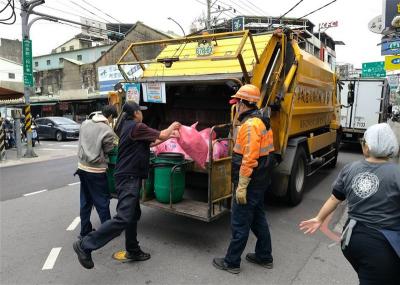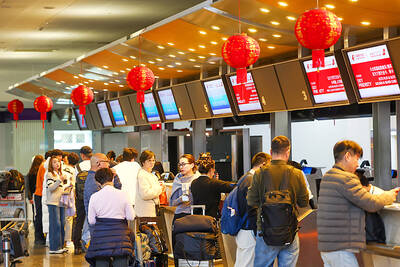A government official who has warned that the nation’s high-speed rail line could become inoperable in 10 years yesterday said the government had put forward a plan to resolve a land subsidence problem.
“Taiwan High Speed Rail can operate safely without hazards when the plan to close 1,000 deep wells in Changhua County and Yunlin County in 10 years is implemented thoroughly,” Public Construction Commission Minister Lee Hong-yuan (李鴻源) said.
Lee (who doubles as a minister without portfolio) called an intergovernmental meeting to finalize a plan to address the land subsidence problem, which is mainly attributed to overuse of underground water.
Under the plan, the government aims to reduce the amount of underground water pumped from wells that extend down more than 50m, known as deep wells, by 210 million tonnes by 2021, Lee said.
The section of the high-speed rail line that suffers the worst subsidence lies between Changhua County’s Sijhou Township (溪州) and Yunlin County’s Tuku Township (土庫), where the average subsidence was 6.4cm, data released by the Water Resources Agency last month showed.
Ground subsidence problems can be solved in 10 years with subsidence in the area decreasing to less than 3cm after the 1,000 deep wells are closed, Lee said.
Lee said agricultural irrigation would not be affected because it uses water that is mostly pumped from shallow wells.
Alternative water resources will partly come from the Hushan Reservoir (湖山水庫) in Yunlin County, whose water-holding capacity is about 50 million tonnes, and partly from water conservation measures that can assist industries to increase the water reuse ratio from 10 percent to between 50 percent and 60 percent, Lee said.

The US House of Representatives yesterday passed the PROTECT Taiwan Act, which stipulates that Washington would exclude China from participating in major global financial organizations if its actions directly threaten Taiwan’s security. The bill, proposed by Republican US Representative Frank Lucas, passed with 395 votes in favor and two against. It stipulates that if China’s actions pose any threat to Taiwan’s security, economic or social systems, the US would, “to the maximum extent practicable,” exclude China from international financial institutions, including the G20, the Bank for International Settlements and the Financial Stability Board. The bill makes it clear that China

Garbage and recycling schedules are to vary from Saturday through Sunday next week over the Lunar New Year holiday period. The following collection information is from the governments of the six special municipalities. Taipei Regular service: Sunday to Monday next week. No service: Tuesday to Thursday next week. Extra service: Friday next week. Regular service resumes: Saturday next week. New Taipei City Extra service: Sunday. Adjusted collection time: Monday next week — garbage collection is to begin in the morning and end at 6pm. No service: Tuesday to Thursday next week. Regular service resumes: Friday next week. Note: Garbage can be dropped off at 70

A KFC branch in Kaohsiung may be fined between NT$60,000 and NT$200 million (US$1,907 and US$6.37 million), after a customer yesterday found an entire AAA battery inside an egg tart, the Kaohsiung Department of Health said today. The customer was about to microwave a box of egg tarts they had bought at the fast-food restaurant’s Nanzih (楠梓) branch when they checked the bottom and saw a dark shadow inside one of them, they said in a Threads post. The customer filmed themself taking the egg tart apart to reveal an entire AAA battery inside, which apparently showed signs of damage. Surveillance footage showed

GROUP EFFORT: The number of inbound travelers rose 11 to 12 percent last month, with a significant increase in tourists from Europe and North America, an official said The government aims to attract 9.4 million visitors this year, the Tourism Administration said yesterday, citing last year’s success in diversifying tourist markets. Taiwan last year drew about 8.57 million international arrivals, 72.3 percent of pre-COVID-19 levels. By contrast, the nation had about 18.94 million outbound tourists last year, surpassing the pre-COVID-19 level of 17.1 million. The estimated tourism revenue deficit was about NT$700.9 billion (US$22.22 billion). Taoyuan International Airport Corp expects more than 160,000 passengers to pass through the nation’s largest airport daily during the Lunar New Year holiday, which begins on Saturday. As of Jan. 30, the nation’s average hotel occupancy rate